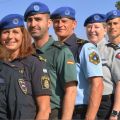Because criminals do not stop at national borders, Uwe Jacob, then head of the State Criminal Police Office of North Rhine-Westphalia, reacted decisively in 2015. Peter Slabbers, "Hoofdinspecteur van Politie der Niederlande" from the "Eenheid Limburg", was given an office in the LKA NRW in order to further improve police exchange on both sides of the border as a liaison officer for the Dutch national police (Nationale Politie).
Frank Hoever, the head of the LKA NRW, also knows: "Cross-border crime prevention is of great importance. It is dynamic and must be constantly adapted. Based on his experience as a criminal police officer and his knowledge of international connections in many areas of crime, he aims to ensure fast and effective cross-border cooperation.
At his inauguration, he emphasized that he is particularly keen to further expand contacts with the Dutch and Belgian authorities. International cooperation is now a strategic focus at LKA NRW. One example: on October 31, 2016, the then Federal Minister of the Interior Thomas de Maiziére, the Minister of the Interior from Belgium, the Minister of Security and Justice of the Netherlands and the Ministers of the Interior of the states of North Rhine-Westphalia, Rhineland-Palatinate and Lower Saxony signed the so-called "Aachen Declaration". In doing so, they agreed to intensify cross-border cooperation in the fight against residential burglary. Since then, the LKA NRW and those responsible in the other states have been working together to put the agreed packages of measures into practice. The district police authorities are intensifying this cooperation through a variety of measures in their daily work and report to the LKA NRW on an annual basis.
Successes confirm the joint work
The results of the last few months show how well the cooperation between the countries works: for example, the work of joint investigation teams has led to arrests after ATM blasts. Joint investigations into mobile perpetrators of property crime (MOTIV concept - targeting mobile perpetrators) have also proved to be particularly valuable. This has resulted in important operational contacts. Joint agreements are reached on how to proceed and best practice methods are exchanged on both sides of the border.
Joint exercise on the German-Dutch border
In the context of German-Dutch cooperation, it became increasingly clear to those responsible how important it is to carry out a joint exercise in order to be able to deal with a cross-border attack situation in an emergency. As early as the end of 2015, they therefore met at a strategic level at the NRW State Criminal Police Office. In September 2016, German and Dutch police commanders and chiefs of staff held a joint planning meeting at the State Office for Training, Further Education and Personnel Affairs of the NRW police in Selm. As a result, those responsible decided to hold a large joint staff exercise. Several planning meetings were then held on the Dutch side in the second half of 2017. The permanent staff of the Bielefeld police headquarters prepared the exercise, in which the permanent staff of the Münster police headquarters, the state control center and the LKA NRW with the situation service and an information collection point (ISA) at the state security department took part, among others.
Exercise shows need for improvement
In November 2017, the time had come. The scenario of the exercise: there is an attack in the Netherlands at the outlet center in Roermond. The perpetrators then flee in the direction of Germany. A pursuit had to be aborted. At around the same time, other perpetrators carry out an attack in the town of Emmen, around 250 km to the north. They also flee in the direction of Germany. The aim of the exercise was to rehearse the cross-border exchange of information between the police organizations involved in the Netherlands, North Rhine-Westphalia and Lower Saxony. Due to the operational situation in Roermond and the escape across the border to Germany, which is only a few kilometers away, it was necessary to quickly pass on information relevant to the investigation between the responsible police authorities in the Netherlands and the police in North Rhine-Westphalia. The follow-up has shown that there are areas in the processes that need to be changed, further developed or adapted. We are already working on this. These are steps in the right direction to protect citizens on both sides of the border from further attacks. Police leaders from both countries accompanied the other country's exercise as observers. Their perceptions were also incorporated into the follow-up.
Consequences of the exercise
The follow-up in Arnhem in the Netherlands with the participation of all incident commanders had a number of consequences. The internal follow-up work carried out at North Rhine-Westphalian level in Bielefeld was also taken into account:
Communication is everything
The prepared exercise necessitated regular exchanges and ongoing communication. In cross-border operations, the rapid transfer of situation information between the countries involved is particularly crucial in order to manage them successfully. Structured communication channels, e.g. pre-established telephone connections between the German control centers and the Dutch "Meldkamern" (control centers) as well as the "EUCOM" digital radio paging group, must be used for this purpose. The exchange must become even faster here.
Exchange of connectors
It is particularly important to have BAO liaison officers with appropriate language skills during such an operation, especially in the other units. This ensures that no information is lost and essential information about the course of the operation is communicated quickly. LKA NRW and LZPD NRW have already developed a concept together with the Dutch police, reached concrete agreements on this and have already exchanged BAO liaison officers.
Hospitations in the neighboring country
In major cross-border operations, it will be crucial for success to understand the communication channels and command structures of the neighboring country. Mutual observations on both sides of the border make a valuable contribution to this. The LZPD NRW has already intensified its cooperation with the "Meldkamers" in the Netherlands, in particular with the direct contact in Driebergen. Police commanders from Germany and the Netherlands have been able to gain their own impression of the way in which the police in the respective neighboring country handle operations and structures through the LZPD NRW during comparable BAO situations. The intention is to offer BAO liaison officers similar opportunities.
Whether all these measures are effective will be reviewed in the future by means of another joint exercise.
Recognizing parallels - understanding differences
Factors that determine success in combating crime and overcoming attacks have already been recognized in both countries. It will be particularly beneficial and useful to incorporate the more effective methods of one into the portfolio of the other and firmly establish them as common standards. BAO liaison officers will continue to be a valuable complementary instrument to the existing communication structures. The good networks that already exist will be further expanded and will be even more closely knit in the future. This will make it much more difficult for cross-border criminals and terrorists to operate in the future.

